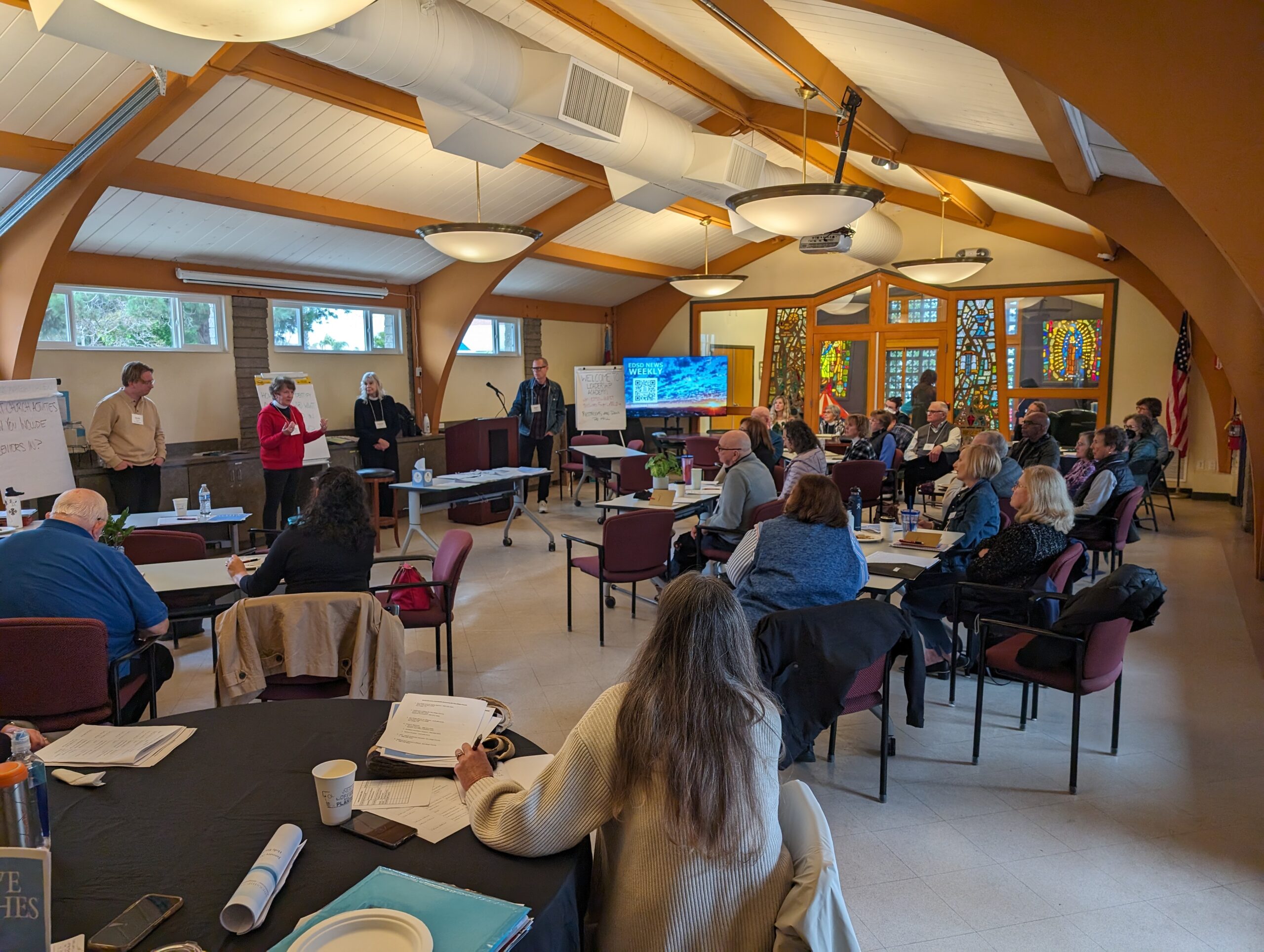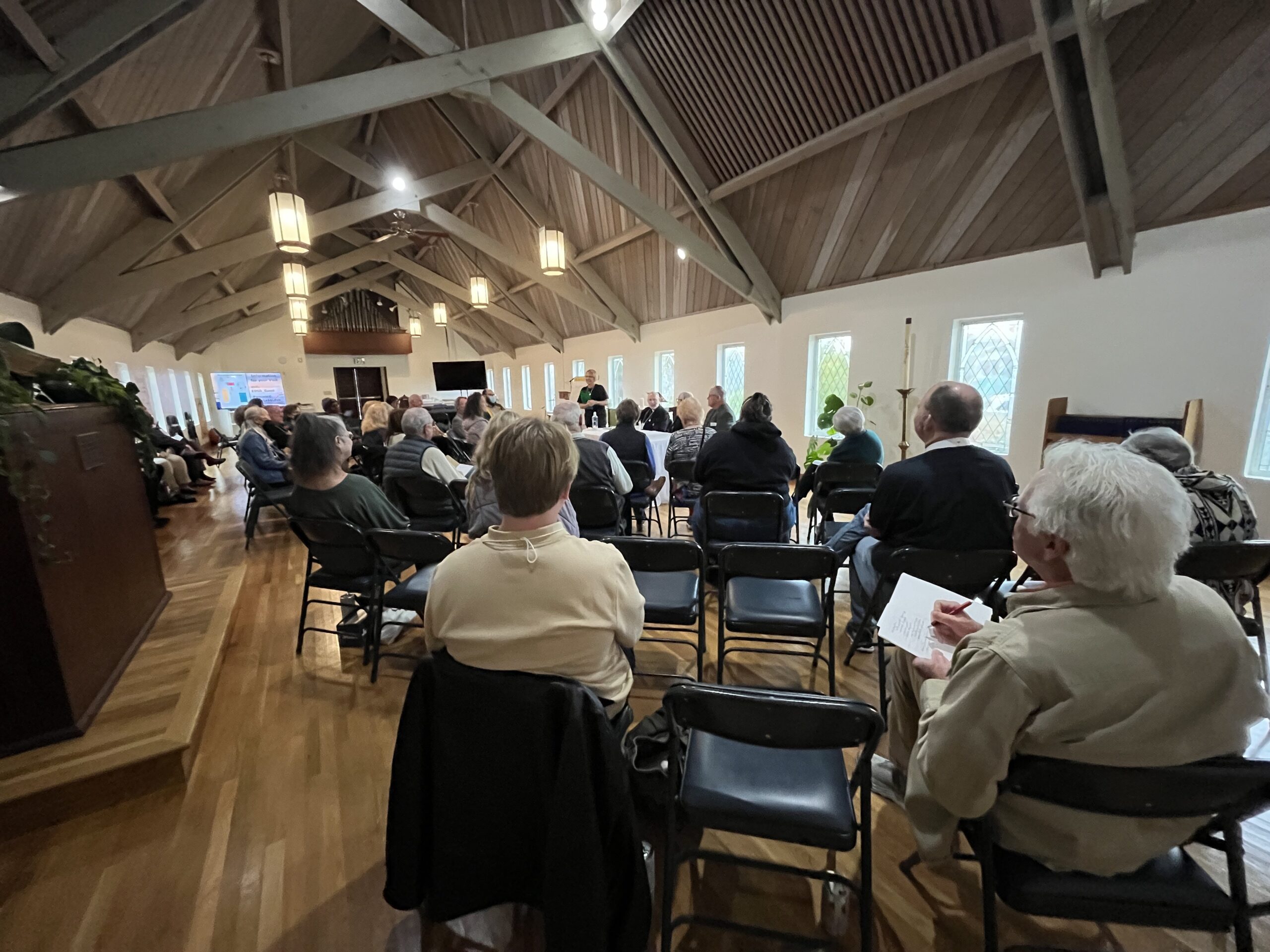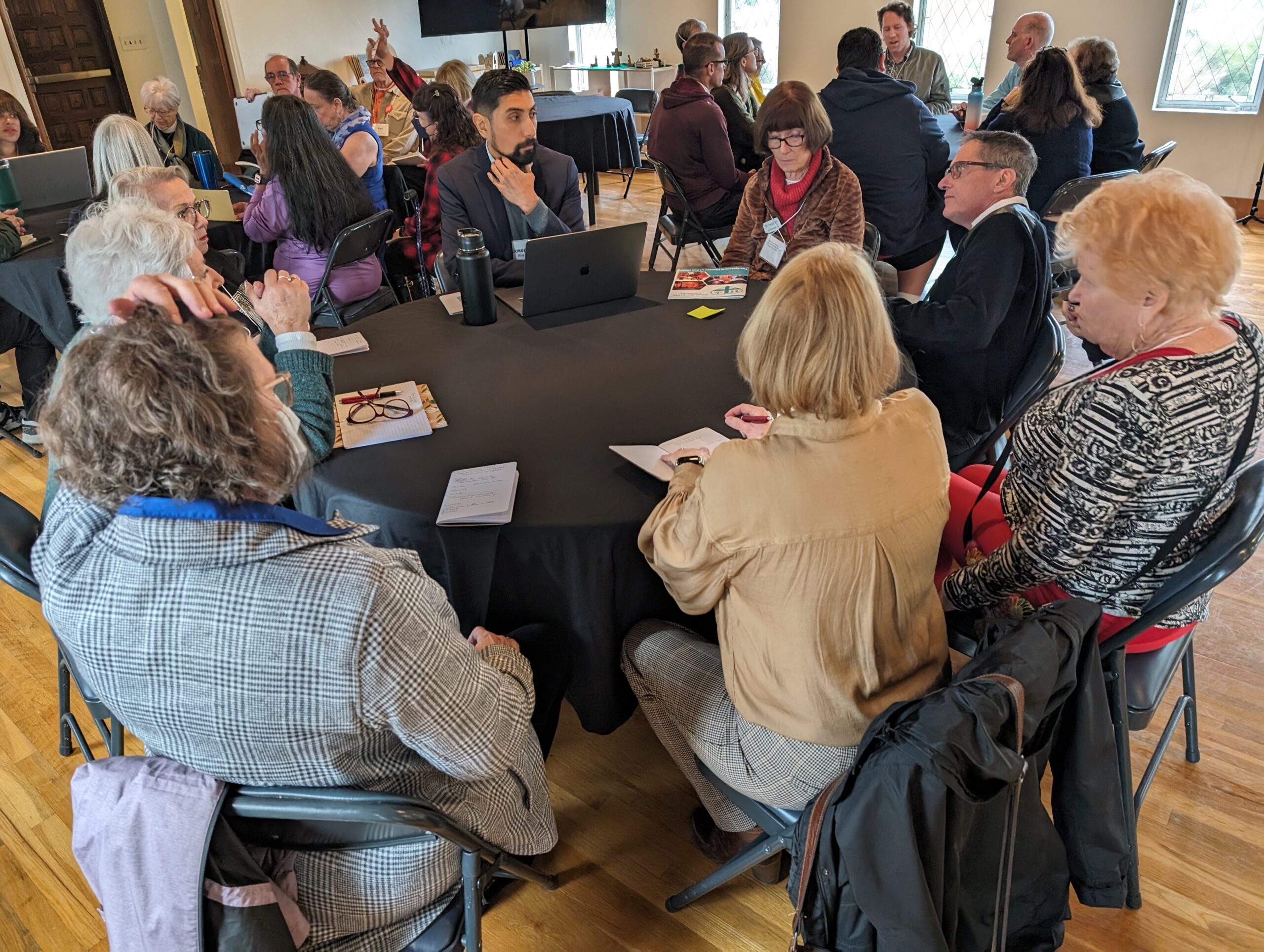May All That We Do Start And End With Love
Enjoy this written copy of the sermon provided by Rachel Ambasing at Leadership Academy 2024’s Opening Eucharist. (Texts: 1 Samuel 17:32-40; John 15:9-17)
My call is to support our congregations in moving toward a diocese where everyone has enough and where everyone can find belonging. My name is Rachel Ambasing, I serve on the Diocesan Staff as Missioner for Community Vitality and Diversity. I also get to serve as Lay Pastor for this emerging faith community that we’re growing here in Ocean Beach called Church of the Resurrection.
I’m grateful and excited for a couple of reasons: one is that this is the relaunch of Leadership Academy, and the first one we’ve held in person since 2020, and related to that is 2024 is our diocese’s Year of Leadership. I’m also glad because I’ve realized what a blessing it is to be able to gather in community, especially when we can gather with people we don’t get to see very often or with people that we haven’t met yet–to just be together, learn together, learn from each other, and to see what might unfold as we journey through Leadership Academy together.
held in person since 2020, and related to that is 2024 is our diocese’s Year of Leadership. I’m also glad because I’ve realized what a blessing it is to be able to gather in community, especially when we can gather with people we don’t get to see very often or with people that we haven’t met yet–to just be together, learn together, learn from each other, and to see what might unfold as we journey through Leadership Academy together.
Here at Resurrection Ocean Beach, we try as much as possible to practice mutuality, especially during our preaching, so since I’ve shared with you how I’m feeling, I’ll pose the same question to you – how are you feeling? How are you feeling this morning, in this space, surrounded by all these people who you may or may not yet know?
And, I’m also wondering – why are you here? What led you here, to this space, on this Saturday morning? Was it curiosity? A very convincing invitation from your clergy or congregational leadership? Obligation? Concern for your community? Or…what if love is what led you here? How is love a part of your journey here today? And how could love be a part of your journey today?
 Love has been on my mind a lot lately, mostly because around the end of 2023, a local thought leader named Jessica Dickson, who I follow on Instagram, posted an exhortation of sorts to anyone setting New Year’s Resolutions or New Year’s intentions, inviting us to create intentions not based on shrinking ourselves or our own perceived inadequacies, but instead to set intentions that start and end with love.
Love has been on my mind a lot lately, mostly because around the end of 2023, a local thought leader named Jessica Dickson, who I follow on Instagram, posted an exhortation of sorts to anyone setting New Year’s Resolutions or New Year’s intentions, inviting us to create intentions not based on shrinking ourselves or our own perceived inadequacies, but instead to set intentions that start and end with love.
What it would mean for me to set an intention that starts and ends with love, because love means so many things, and has been given countless definitions by countless brilliant minds. And I was reminded of these wonderings as I reflected on this morning’s Gospel and Jesus’ exhortation to his disciples – to us – to abide in his love. What does that mean? What would it look like to dwell, to remain, to be held and kept in God’s love?
I was part of a Lectio Divina Cohort this past summer with a local contemporary monastic organization called Shema, and one of the cohort leaders, Pastor Kevin Portillo, shared:
To abide in God’s love is for us to be aware of and accept the fact that God knows and loves every single part of us – especially those parts of us that might seem too tender, or too shameful, or too weak or wounded or unwanted for us to even acknowledge in ourselves. Then, to live as people accepting of this gift, or to live as people abiding in God’s love, would be to live trusting that we can consciously bring our fullest, truest selves, our most loving and loved selves to God, and also, to the forefront of our lives; It would mean we no longer believe the lie that we have to lie to ourselves, or to others, or supplement ourselves, or hide parts of ourselves away, in order to be worthy.
To live as people abiding in God’s love is to allow ourselves to be open and perhaps even vulnerable, trusting that we can do so because God has us; God holds us. And, connecting this with the theme of leadership, what would it mean, and what would it look like to be a leader who presented their fullest, truest selves to the world, especially those parts of themselves that others might deem unfit or unworthy? If there was a leader brave enough to claim and live as nothing more and nothing less than who God created them to be – what could a leader like that achieve?
We might see a possible answer to those questions in our first reading, which is a piece of the story of David and Goliath – one of the most well-known and most referenced Biblical stories, even in non-religious contexts, because it’s widely known as the quintessential underdog story: where one unlikely, “lesser” opponent, David, faces off against a much larger, mightier, dominant force, in Goliath, who is referred to in today’s reading as “the Philistine.”
So, leading up to this point of the story, the Philistines have been warring with Israel, and in the middle of these battles, Goliath, the monstrous, imposing champion of the Philistines, has issued a challenge: for any one man from the ranks of Israel to fight him, one-on-one. If this man were to defeat him, the Philistine forces would then submit themselves as slaves, but if this man were to lose, Israel would condemn their own ranks to slavery. The stakes are high, and the likelihood of being killed by Goliath is even higher, so, understandably, none of the Israelites rise to the occasion… until David.
the monstrous, imposing champion of the Philistines, has issued a challenge: for any one man from the ranks of Israel to fight him, one-on-one. If this man were to defeat him, the Philistine forces would then submit themselves as slaves, but if this man were to lose, Israel would condemn their own ranks to slavery. The stakes are high, and the likelihood of being killed by Goliath is even higher, so, understandably, none of the Israelites rise to the occasion… until David.
And so we see in today’s reading this interaction between David, who is at this time a young shepherd and is so slight in stature that Goliath later compares his physical appearance to that of sticks. And then there is Saul, a seasoned warrior whom David served as armor-bearer; Saul is described earlier in the first book of Samuel as being an entire foot taller than anyone else in Israel. As David tells Saul of his intention to face Goliath, Saul responds by telling David that he lacks the training and experience as a warrior and, therefore, can’t win. David doubles down on his claim, letting Saul know that in his time as a shepherd, he was wrestling with bears and lions, all for the sake of saving sheep.
David sees what Saul is blind to, and sees, perhaps, what God might see. Although David’s experience is different from the traditional warrior training that Saul and Goliath have, he understands that his skills aren’t insignificant – and he recognizes that God has been with him – abiding with him – every step of the way. David stayed steadfast and true to himself and true to God as he honored the sacredness that is his life. How often do we, in our own lives, dismiss our skills or experiences as insignificant or irrelevant just because they diverge from the norm or from tradition?
David convinces Saul. So Saul helps prepare David for battle by outfitting David in Saul’s own armor and sword. Which makes sense – if a person is going out to battle, especially someone as inexperienced in battle as David, it makes sense to arm him, as the other warriors are armed. David gives the armor a fair try, only to realize that, although the armor is useful to Saul, and to everything Saul is and has been made to be, Saul’s armor on David is an impediment and actually restricts David from moving as he was made to move, from using the skills and gifts God had given him.
David takes off Saul’s armor and instead picks up his shepherd’s equipment: his staff, his shepherd’s bag, plus a sling and 5 stones, and heads out to face Goliath. David goes into battle fully vulnerable in the sense that he’s wearing nothing to shield him, nothing to protect him, except for the knowledge and faith that God had him, that God’s abiding love held him.
He faces and defeats this monster of empire, this legend of violence, equipped with little more than his skill and experience and equipped with nothing less than exactly who God had called him to be. How many times in our own lives have we tried on armor meant for someone else, armor that didn’t serve the purposes to which God has called us yet didn’t have the awareness or even the audacity to dare to take it off? When in our own lives, have we chosen to hide or stifle ourselves – those best, most special, and unique parts of ourselves—in ill-fitting armor because wearing armor is just the way we’ve always done it? Or because we were afraid that there would be nothing to hold us, to abide with us, to love us if people knew who we were once that armor comes off?
As we all try to lead and practice ministry, and love our neighbors, and build community in this world filled with all sorts of giants of Empire – giant systems of oppression, and violence, and beasts of discord and division of all kinds – sometimes we might be tempted to lead by embodying ways that are armored, ill-fitting. It might feel like protection or serving our call when it actually does the opposite–hiding our truest, most loving parts of ourselves – the pieces of us that might be most needed in this world. As we see in this bit of David’s story – Goliath wasn’t defeated by another Goliath, nor was he defeated by a more typical, armored, mighty warrior like Saul – it was only someone who had the courage to know exactly who God had made him to be, and to embody that person, fully and vulnerably.
Bringing us back to today and to what we’re doing here at Leadership Academy: In her book “All About Love,” Bell Hooks writes, “The choice to love is a choice to connect – to find ourselves in one another.” It’s hard to find ourselves in one another if we all collectively hide ourselves away. It’s easier to find ourselves in one another if we allow ourselves to be known. And so my hope for each of you, and for myself, is that today, we choose to abide in God’s love by choosing to connect, to learn from each other, yes, and to allow ourselves to see and be seen in all of the rich and varied ways God expresses God’s self through each of us, in all of our different communities and contexts.
And may all that we do start and end with love.
by
Category: #Outreach, #Worship & Formation
Respond to this:
One reply to “May All That We Do Start And End With Love”
Recent Stories
My mother was ordained an Episcopal priest on January 15, 1994, at All Saints’ Episcopal Church in Beverly Hills. I was ten years old, and her being ordained wasn’t odd […]
In December 2023, I received a letter from Julia Ayala Harris, President of the House of Deputies, saying, “I have reviewed your application and, after prayerful discernment, invite you to […]
When we love something, we share it with our friends and family; like a new show on Netflix or a great restaurant in the neighborhood, we can’t help but share […]





Dear Rachel,
It was a pleasure to attend the Leadership Academy, and internalizing the strong opening sermon you gifted us with. I remember meeting you and your father, James, at a Cursillo event, so many years ago. You were so open to learn and share your thoughts presented in the event. And now, here you are: still open, still sharing, leading us from scripture, from experience, with love, to a closer walk with our Savior.
I cannot think of a better summery of the two greatest commandants given to us, than your closing sermon sentence: “And may all that you do start and end with love.”
God willing, I’ll see you, on or before, the next leadership event.
Your forever friend,
Larry